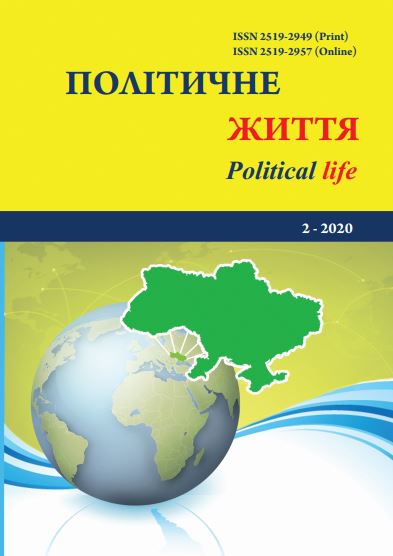Political elite in the institutional environment.
DOI:
https://doi.org/10.31558/2519-2949.2020.2.5Keywords:
institutional environment, modernization, political elite, political system, political practice, communicationAbstract
This paper is a study of the subject-matter and features of the institutionalization of the elite in the process of modernization of the political system. It is proved that the functioning of the institutional environment takes place at the macro and micro levels. In this context, the article studies the degree of coherence of the institutional environment and its dependence on the consent of all the subjects to respect the rules and norms that ensure social and political order. The study reveals a set of legitimate rules of interaction and competitive political practices that form the basis of the institutional environment (functioning of the elite). It describes the communication processes that form such interactions in the institutional environment.
It is concluded that clear rules and procedures of lobbying allow balancing the interests of public groups and political elites on the basis of compromise solutions. Accordingly, lobbying ensures a pluralism of legitimate opportunities for public participation in the development and adoption of political decisions, provides publicity to the process and activities of state authorities. Authors grounded that a set of legitimate rules of interaction and competitive political practices form the basis of the institutional environment of elite functioning. A holistic understanding of the rules of interaction and practices helps to determine the procedure of the elite institution in the political modernization processes, the dynamism of which is provided by the optimal choice of political technologies. Also, communication processes shape specific types of interaction in the institutional environment, facilitating feedback, optimal distribution of resources, and the use of political system capabilities to optimize modernization changes. The elite institute, forming and controlling communication processes, ensures the involvement of public initiative in the practical implementation of modernization projects on the basis of partnership and mutual responsibility.
References
Babosova E. Kotseptualizatsiya ponyatiya «publichnaya politika». 2013. URL: http://cyberleninka.ru/article /n/kontseptualizatsiya-ponyatiya-publichnaya-po1itika.pdf (accessed 25.11.2016).
TeleshunS. O., ReiterovychI. V., SytnykS. V. et al. Vzaiemodiia derzhavy i suspilstva v protsesakh publichnoi polityky : nauk. rozrobka/avt. kol. Kyiv: NADU, 2013. p. 44.
Golovakha E., Panina N. Osnovnyye etapy i tendentsii transformatsii ukrainskogo obshchestva: ot perestroyki do «oranzhevoy revolyutsii». Sociology: theory, methods, marketing. 2006. No. 3, pp. 32-51.
Gerasimova E., Chernyayeva T. Formy i rezhimy vzaimodeystviya vlasti i obshchestva v usloviyakh politicheskoy modernizatsii Rossii. 2012. URL: http://cyberleninka.ru/article/n/formy-i-rezhimy-vzaimodeystviva-vlasti-i-obschestva-v-uslovivah-politicheskoy-modernizatsii-rossii (accessed 04.08.2015)
Gavra D. P. Obshchestvennoye mneniye i vlast: rezhimy i mekhanizmy vzaimodeystviya. Journal of sociology and social anthropology, 1998. vol. 1, No. 4, pp. 53-77.
Holovatyi M. Dialoh mizh vladoiu i suspilstvom – vazhlyva zasada formuvannia ukrainskoi derzhavnosti. Political management. 2011. No.5, pp. 19-24.
Grazhdane i politicheskiye praktiki v sovremennoy Rossii: vosproizvodstvo i transformatsiya institutsionalnogo poryadka / Editorial board: Patrushev S. (executive editor), Ayvazova S., Panov P. Moscow: RAPN; ROSSPEN, 2011. 318 p.
Zelenko H. I. Koalitsiia chy paktuvannia: modeli vzaiemodii politychnykh elit na postsotsialistychnomu prostori. Elites and civilizational processes of formation of nations. Kyiv: TOV UVPK "EksOb", 2006. Vol. 2, pp. 253-265.
Institutsionalnaya politologiya: sovremennyy institutsionalizm Ipoliticheskaya transformatsiya Rossii
/ Edited by S. Patrushev. Moscow, ISP RUN, 2006. 600 p.
Kokorkhoyyeva D. Sovremennyyye issledovaniya institutov politicheskoy vlasti (sravnitel’nyy analiz teoriy). Belgorod State University Scientific Bulletin. HistorySerie. Politicalscience. 2010. No. 4, ed. 14, pp. 208-2017.
Komunikatsiia: demokratychni standarty v roboti orhaniv derzhavnoi vlady / Edited by O. Dniprenko. Kyiv: TOVКиїв: ТОВ "Vistka", 2008. 164 p.
Lurye S., Kazaryan L. Mirovaya politika i eye prognosticheskiye indikatory. Polis. 2012. No 2. pp. 85-97.
Mitrokhina T. N. Politicheskiy proyekt kak kategoriya politicheskoy nauki. 2015. URL: https://cyberleninka.ru/article/n/politicheskiy-proekt-kak-kategoria-politicheskoy-nauki(accessed 16.12.2015).
Materialy kruhloho stolu «Hromadianske suspilstvo v 2018-mu: novi vyklyky, novi zavdannia»
(do 25-richchia Fondu «Demokratychni initsiatyvy» imeni Ilka Kucheriva) 6 bereznia 2018 roku. URL: http://dif.org.ua/uploads/pdf/13963398l65a9eeflb022177.77359526.pdf (accessed 27.04.2018).
Nort D. Instytuty, protsesy ta funktsionuvannia ekonomiky. Kyiv: Osnovy, 2000. 230 p.
Nisnevich Yu. Informatsionno-kommunikatsionnaya stabilizatsiya politicheskoy sistemy. 2006. URL: http://elibrary.ru/item.asp?id=9913771 (accessed 22.01.2017)
Ostapenko M. Politychna komunikatsiia: teoretychni aspekty doslidzhennia. Political management. 2012. No. 3, pp. 135-144.
Pushkareva G. V. Politicheskiy menedzhment. URL: http://uchebnik – online.com/133/1209.html
(accessed 05.10.2016)
Politicheskoye obespecheniye biznesa / Edited by Yu. Konoplin. Moscow: MAI Publishing house, 1995. pp. 45-54.
Riker W. The theory of political coalitions. New Haven; CT/London: Institute for Advanced Studies, 2000. 18 p.
Rybakov A., Studnikov P. Kategoriya «politicheskiy institut» v sovremennoy politicheskoy nauke.
Topical issues of social sciences: sociology, political science, philosophy, history: collected articles on the materials of international research-to-practice conference, February 18, 2015. Novosibirsk: SibAk, 2015. pp. 18-27.
Skopin A., Klimov A., Zaytsev D. Aktornyy podhod v sovremennykh sotsial’nykhnaukakh: ekonomiki, sotsiologii I politologii. URL: https://www.hse.ru/data/2012/12/16/1300987726/Ckoпиh%20A.Ю.,%20Kлиmoв% 20A.И.,%203aйueв%20Д.Г.%20Aк..в%20coвpeмeнныx%20coциальныx%20нayкax.pdf
(accessed: 12.09.2016).

